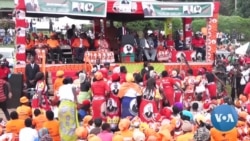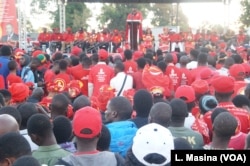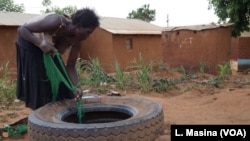Malawians go to the polls Tuesday in local, parliamentary and presidential elections. Seven candidates are running for president, but the real battle is among incumbent President Peter Mutharika, Vice President Saulos Klaus Chilima and main opposition leader Lazarus Chakwera.
With just a few days to go, it remains difficult to predict the winner.
The candidates are crisscrossing Malawi to woo voters in what many say are country’s most highly contested elections since the start of multiparty politics in 1993.
Nepotism, corruption campaign issues
The opposition Malawi Congress Party is determined to return to power since losing the 1994 elections.
Some in the party, including its presidential candidate, Lazarus Chakwera, say nepotism is rampant in the current administration, a charge the government denies.
Chakwera says if there is a leader in Malawi at the moment who can unite the whole country to stop the tendency toward nepotism and employ people based on ethnicity and regionalism, “it’s me, Chakwera.”
Vice President Chilima, who leads the United Transformation Movement, or UTM party, says corruption forced him to break away from the ruling party.
Multiple times during this campaign, he accused the governing party of planning to rig the polls; but now he says the voting is safe.
He says there is no one who will rig this election. Those who registered should go to vote. “And you should vote for UTM leaders for the country to develop. Vote wisely and without fear,” he said.
President pushes development
Meanwhile, President Mutharika tells voters he will continue developing the country if he wins a second five-year term.
He says his administration has so far constructed 94 bridges in different areas. He says this had never happened before in the country’s history but, “We are doing that,” he says. He added that the government will continue to do what it has been doing.
Rural vote
Observers say they are unable to predict who will win Tuesday’s vote. Political analyst Sherrif Kaisi says the outcome depends on the rural areas, where more than 80 percent of Malawians live.
“This is because people in town, you can see even the numbers on those who registered, they are not much convincing numbers like those in the villages,” Kaisi said.
About 6.7 million Malawians are registered to vote. Results are expected by May 29.












